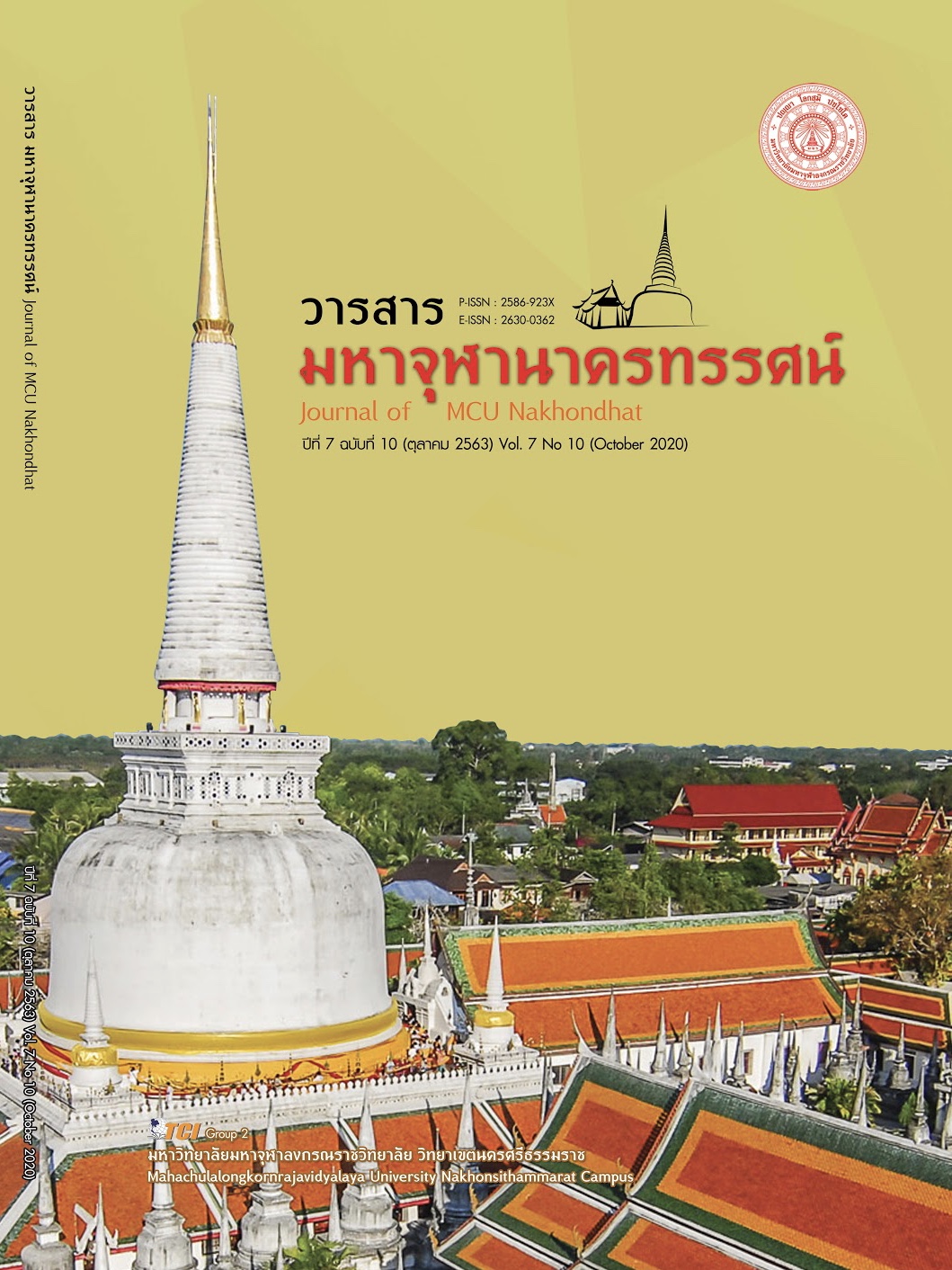THE DEVELOPMENT INTERPRET DATA AND EVIDENCE SCIENTIFICALLY COMPETENCY OF GRADE 11TH STUDENT BY USING ARGUMENT - DRIVEN INQUIRY MODEL
Main Article Content
Abstract
The objectives of this research article were to develop the Interpret Data and Evidence Scientifically Competency of Grade 11 student that pass the criterion of 70 percent of full score, in order to pass the criterion of 70 percent of students using argument - driven inquiry model. Target group consisted of 17 students who has a Interpret Data And Evidence Scientifically Competency problem. The research instrument were 1) 9 lesson plans using argument - driven inquiry model 2) Interpret Data And Evidence Scientifically test 3) student’s learning behavior observation forms 4) student’s learning experience recording forms. The results were as follows: 1) The Interpret Data And Evidence Scientifically Competency of grade 11th student after learning with argument - driven inquiry model. showed that the students Interpret Data And Evidence Scientifically Competency mean scores in the first, the second, and the third cycles were 54.90, 64.70, and 76.47 percent respectively. It obviously be seen that the students' mean score passed the criteria in the third cycles. 2) The number of students that had mean score of Interpret Data And Evidence Scientifically competency passed the criterion of 70 percent of full score in the first, the second, and the third cycle had 2 students (11.76%), 7 students (41.17%), and 16 students (94.11%), respectively. It could be seen that the number of students passed the criteria in third cycle.
Article Details
References
ภัทราวรรณ ไชยมงคล. (2559). การวิจัยปฏิบัติการเพื่อพัฒนาความสามารถในการให้เหตุผลเชิง วิทยาศาสตร์ เรื่อง ปริมาณสารสัมพันธ์ของนักเรียนชั้นมัธยมศึกษาปีที่ 4 ด้วยรูปแบบการสืบเสาะที่ขับเคลื่อนด้วยกลวิธีการโต้แย้ง. ใน วิทยานิพนธ์การศึกษามหาบัณฑิต สาขาเคมี. มหาวิทยาลัยเชียงใหม่.
สถาบันส่งเสริมการสอนวิทยาศาสตร์และเทคโนโลยี. (2557). ผลการประเมิน PISA 2012 คณิตศาสตร์การอ่านและวิทยาศาสตร์นักเรียนรู้อะไร และทำอะไรได้บ้าง. กรุงเทพมหานคร: สถาบันส่งเสริมการสอนวิทยาศาสตร์และเทคโนโลยี.
. (2559). สรุปผลการวิจัย PISA 2015. กรุงเทพมหานคร: สถาบันส่งเสริมการสอนวิทยาศาสตร์และเทคโนโลยี.
สันติชัย อนุวรชัย. (2553). ผลของการเรียนการสอนชีววิทยาด้วยด้วยรูปแบบการเรียนการสอนสืบสอบร่วมกับกลวิธีการโต้แย้งที่มีต่อความสามารถในการสร้างคำอธิบายเชิงวิทยาศาสตร์และความมีเหตุผลของนักเรียนชั้นมัธยมศึกษาตอนปลาย. ใน วิทยานิพนธ์ครุศาสตรมหาบัณฑิต สาขาการศึกษาวิทยาศาสตร์. จุฬาลงกรณ์มหาวิทยาลัย.
สุนีย์ คล้ายนิล และคณะ. (2551). ความรู้และสมรรถนะทางวิทยาศาสตร์สำหรับโลกวันพรุ่งนี้. กรุงเทพมหานคร: เซเว่นพริ้นติ้งกรุ๊ป.
Berland, L.K., & McNeill, K.L. (2009). Using a learning progression to inform scientific argumentation in talk and writing. Science Education, 94(5), 765-793.
Cetin, P.S., & Eymur, G. (2017). Developing students' scientific writing and presentation skills through argument driven inquiry: An exploratory study. Journal of Chemical Education, 94(7), 837-843.
Holbrook, J. & Rannikmae, M. (2007). Nature of science education for enhancing scientific literacy. International Journal of Science Education, 29(11), 275-288.
OECD. (2012). PISA 2015 Item Submission Guidelines: Scientific Literacy. Paris: OECD.
. (2013). PISA 2015 Assessment and Analytical Framework. Paris: OECD.
Sampson et al. (2011). Argument-driven inquiry as a way to help students learn how participate in scientific argumentation and craft written arguments: An exploratory study. Science Education, 95(2), 217-257.
Tuba, D. & Sedat, U. (2012). The Effect of Argument-Driven Inquiry on Pre-Service Science Teachers’ Attitudes and Argumentation Skills. Tuba Demircio_lu and Sedat Uçar / Procedia - Social and Behavioral Sciences , 46(212), 5035-5039.
Walker, J. P. & Sampson, V. (2013). Learning to argue to learn: argument-driven inquiry away to help undergraduate chemistry students learn how to construct arguments and engage in argumentation during a laboratory course. Journal of research in science teaching, 50(5), 561-596.


